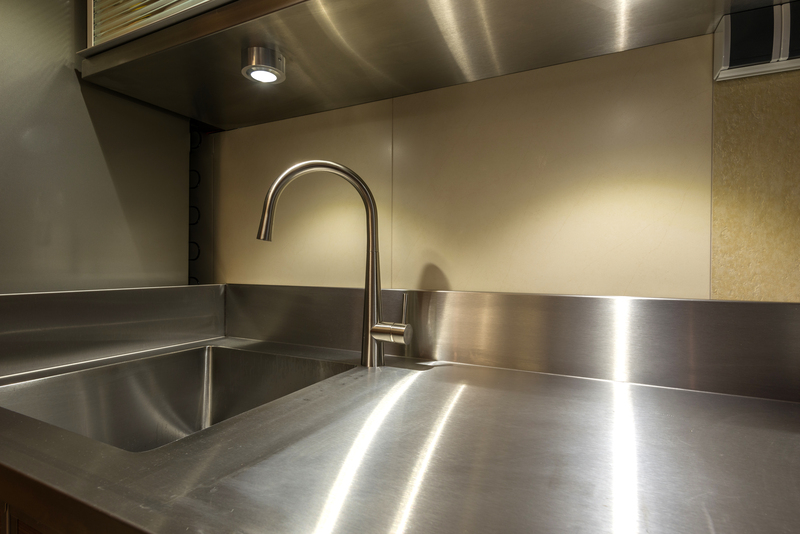Transform Your Home by Removing Pet Odors
Posted on 07/06/2025
Transform Your Home by Removing Pet Odors: The Comprehensive Guide
Pet ownership brings countless joys, from warm companionship to unconditional love. However, one aspect most pet owners can relate to is the challenge of dealing with unwelcome pet odors. Whether you're facing the persistent scent of a litter box, doggy dander, or the aftermath of a pet accident, eliminating these smells is essential for a comfortable and fresh living space. In this article, you'll discover effective ways to remove pet odors and transform your home into an inviting, odor-free sanctuary.

Understanding the Source of Pet Odors
Common Causes of Lingering Pet Smells
- Pet urine: Cat and dog urine can soak into carpets, upholstery, and floors, leaving behind a stubborn odor due to ammonia and bacteria.
- Fur and dander: Loose fur, pet hair, and skin flakes accumulate over time, contributing to musty indoor air quality.
- Saliva and sweat: Dogs in particular produce sweat from their paws, while both cats and dogs spread odor-causing saliva as they groom or chew objects.
- Litter boxes, cages, and bedding: Inadequate cleaning of these can quickly fill a room with unpleasant scents.
- Poor ventilation: Lack of airflow exacerbates existing smells, causing them to linger.
Identifying the source of pet odors is the first crucial step in eliminating them for good. Removing pet odors requires a multifaceted approach targeting not just the air, but all affected surfaces and textiles in your home.
Preparing for Pet Odor Removal
Before you dive into deep cleaning, gather some essential supplies for the best results:
- Enzymatic cleaners: Specifically formulated to break down organic residues causing pet odors
- Baking soda: An all-natural deodorizer for carpets, upholstery, and fabrics
- White vinegar: Cuts through a wide range of odors and acts as a natural disinfectant
- Microfiber cloths, mops, and cleaning brushes
- HEPA vacuum cleaner
- Laundry detergent and pet-safe sprays
Step-by-Step Solutions for Removing Pet Odors
1. Thorough Cleaning of Pet-Occupied Spaces
Transforming your home starts with a regular, thorough cleaning routine:
- Vacuum carpets, rugs, and furniture: Use a HEPA-filter vacuum to trap fine particles and allergens. Pay special attention to common pet hangouts and under furniture.
- Wash bedding and soft furnishings: Clean all pet blankets, covers, and pillows in hot water with a mild, odor-fighting laundry detergent. Don't forget your own bedding and couch cushions.
- Mop hard floors: Use a solution of water and white vinegar or a pet-safe cleaner to disinfect and deodorize hard surfaces.
- Wipe walls and baseboards: Pet oils and dander can transfer to vertical surfaces, so don't neglect these areas.
- Empty and disinfect litter boxes and pet cages: Clean according to manufacturer instructions, and replace litter regularly to minimize smells.
2. Attack Odors at Their Source with Enzymatic Cleaners
For removing embedded pet odors, especially from urine, enzymatic cleaners are your best bet. These products contain natural enzymes that break down odor-causing bacteria instead of masking them. Apply generously to affected areas, allow time to soak in, and blot dry. Repeat as necessary for stubborn stains.
3. Deodorizing Carpets and Fabrics
Baking soda is renowned for its odor-neutralizing properties. Sprinkle a liberal amount on carpets, upholstery, or even inside pet carriers; let it sit for 30-60 minutes (or overnight for strong smells), then vacuum thoroughly. You can also add baking soda to your laundry when washing pet bedding.
For deeper carpet cleaning, consider renting or purchasing a steam cleaner. Hot steam lifts out organic residues trapped within carpet fibers, effectively removing pet odors from the ground up.
4. Improve Air Quality and Ventilation
Clean air is key to a fresh-smelling home. Open windows regularly to encourage airflow, and use exhaust fans in bathrooms or laundry areas. Investing in an air purifier with a HEPA filter and activated carbon can capture airborne particles and neutralize lingering pet odors.
5. Utilize Natural Remedies and DIY Odor Fighters
- Vinegar spray: Mix equal parts white vinegar and water in a spray bottle. Mist on fabrics and allow to air dry (test delicate fabrics for colorfastness).
- Essential oils: Certain oils like lavender, lemon, or eucalyptus (used in moderation) can freshen the air. Add a few drops to a spray bottle of water as a natural air freshener. Never use essential oils directly on your pets or their bedding.
- Activated charcoal: Place small bowls of it in odor-prone areas to absorb smells over time.
*Natural solutions are gentle on both your home and your pets, and can be incorporated into your regular cleaning routine.*
Tips for Preventing Pet Odors
Maintain a Consistent Cleaning Schedule
Consistency is key to an odor-free home. Establish a weekly routine for vacuuming, mopping, and laundering all pet-related textiles. Clean up accidents or spills immediately--fresh stains are easier to remove and less likely to cause persistent smells.
Groom Your Pets Regularly
- Bathe pets as needed (according to breed and veterinarian recommendations)
- Brush daily to reduce loose fur and minimize dander
- Wipe paws after outdoor walks to stop dirt and odor from being tracked indoors
- Check and clean ears weekly (for dogs and cats)
Regular grooming keeps your pet smelling great and makes your cleaning efforts more effective.
Train and Monitor Your Pets
- Litter box training and frequent cleaning will dramatically reduce odors
- Designate a specific potty area for dogs to prevent accidents indoors
- Watch for dietary issues that may cause increased odor or digestive problems
Monitoring your pet's health and habits helps in preventing odor issues before they start.
Special Considerations for Different Types of Pets
Cats
Litter box odor control is especially important. Choose a high-quality, clumping litter with odor-absorbing properties. Clean boxes daily, replace litter at least once a week, and scrub out the box with hot, soapy water monthly.
Remember, some cats are sensitive to scented litters, which can drive them to eliminate outside the box, making odor issues worse. Stick with unscented, low-dust varieties if you notice issues.
Dogs
Watch out for wet dog smell after walks or baths. Always dry your dog thoroughly and wash their bedding regularly. Clean feeding areas and water bowls daily to prevent slobber and food residue buildup.
Accidents: If you have a puppy or senior dog, keep enzymatic cleaner handy for prompt treatment of any in-home accidents. Quick response is vital for stopping odors from setting in.
Small Animals and Birds
Hamsters, rabbits, guinea pigs, and birds all require frequent changing of cage liners and bedding. Wash cages with soap and water weekly. Use cage deodorizers that are non-toxic and safe for your pet.
Mistakes to Avoid When Removing Pet Odors
- Avoid masking odors with heavy scents or air fresheners: These don't address the underlying cause and may irritate pet respiratory systems.
- Don't skip spot treatments: High-traffic or favorite pet spots require targeted cleaning.
- Avoid using ammonia-based products: The smell is similar to pet urine, which may encourage repeat accidents.
- Don't ignore hidden areas: Check behind furniture and in corners for odor sources you might miss.
How to Keep Your Home Smelling Fresh Long-Term
Invest in Professional Cleaning
If you've tried everything and still can't get rid of persistent odors, consider a professional carpet and upholstery cleaning service. Steam and deep-cleaning methods can eliminate the most stubborn smells and refresh your entire living space.
Pet-Safe Air Fresheners and Diffusers
Choose products specifically labeled as pet-safe. Avoid plug-in deodorizers or potpourri that may contain toxic chemicals to animals.
Regular Maintenance Is Key
- Keep up daily and weekly cleaning routines for lasting results
- Replace old, worn textiles that may be harboring entrenched odors
- Rotate pet toys and wash them frequently

Embrace a More Enjoyable, Odor-Free Lifestyle
With the right strategies, products, and consistency, you can eliminate pet odors and truly transform your home. Not only does this enhance your daily comfort, but it also ensures visitors experience a welcoming, fresh environment--without even a hint that it's home to cherished pets.
By addressing odor sources, adopting targeted cleaning routines, and preventing future smells, pet owners can enjoy all the love their animals provide--minus any unpleasant side effects.
Conclusion: Create a Home Both You and Your Pets Can Enjoy
Removing and preventing pet odors is a manageable challenge with far-reaching rewards. Take control with proactive cleaning, proper pet care, and a few strategic investments in the right products. The result? A clean, odor-free home that reflects your pride as a pet parent--and a comfortable haven you and your furry (or feathered) companions will love.
Ready to transform your home by removing pet odors? Start today with these proven tips, and breathe easy knowing your space is as welcoming to guests as it is to pets!




